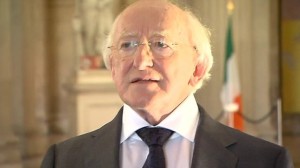
By Sean Ryan - 24 August, 2016

President Michael D. Higgins has said that it is important to remember the “outrages” committed against Protestants during the nation’s struggle for independence.
He made his comments in his address for the annual Michael Collins commemoration last Sunday at Beal na mBláth in Co Cork where Michael Collins was killed on 22 August 1922.
In his speech, President Higgins spoke of Collins’ contribution during the War of Independence from 1919 until 1921.
The signing of the Treaty signalled a willingness to accede to the partition of the island – leading to further conflict and violence in the Civil War.
The violence of the era included a series of attacks around the towns of Bandon, Clonakilty and Dunmanway in Co Cork in April 1922, when the IRA killed 13 Protestants.
This bloodshed was the subject of an RTE documentary in 2009, when the State broadcaster said that hundreds if not thousands of Protestants fled in terror as a result of the apparently sectarian attacks.
On Sunday, President Higgins said Irish people “need to display courage and honesty as we seek to speak the truth of the period”.
This included an appreciation of the “bewilderment” and “dismay” of RIC officers who were targeted by fellow Irishmen during the War for Independence, for example.
He added, “We will be required to face, too, the ruthlessness of many executions performed by the IRA, the mistakes that inevitably happened in killings of purported informers, the executions of Republican prisoners during the Civil War, and the outrages perpetrated during both wars against Protestant people, some of whom were attacked regardless of their actual attitude towards the struggles under way.”
The President said that while it was important to recognise that “the independence we have today was achieved through a War of Independence”.
It was also important “to acknowledge that the recognition that had been given to those Unionists seeking a separate status in the north-east corner of the island”.
He said Michael Collins had accepted partition and added, “Few today would challenge the wisdom of his conscious decision ‘not to coerce the north-east’.”